#surprise wonderfam appearance
Text
Cassie: Don't worry. Diana likes your butt and fancy hair. I know. I read her diary.
Zatanna: She thinks its fancy?
#surprise wonderfam appearance#i think they all would approve of Diana dating a badass magician#zatanna#wonder girl#zatanna zatara#cassie sandsmark#cassandra sandsmark#my post#source: lilo and stitch
17 notes
·
View notes
Text
Wonder Woman #50 postmortem: “You know how strident Wonder Woman fans can be”
I want to cap off my readthrough of this unmitigated shitshow with a look at a recent interview James Robinson did with Newsarama, reflecting back on his twenty-issue Wonder Woman run.
I’m doing this for two reasons: One, because having read the full run and formed my own impressions (and, dare I say, some rather strident opinions), I genuinely do think it can be interesting to see what the writer has to say about it, what they were trying to achieve with it and, looking back, how they feel about the run.
And two, because having read what Robinson has to say, HOOBOY, I HAVE A FEW THOUGHTS OF MY OWN.
Newsarama: James, the one through-line of your entire run is Wonder Woman's twin brother, Jason. I know he was the motivation for you working on this book. Did you know the whole story before you started? Or did this story evolve as you wrote it?
James Robinson: I knew to a degree. As you said, I was specifically asked to pay off the gigantic plot point that Geoff Johns had left at the end of "Darkseid War." So it was always part of my plan.
Are. You. FUCKING. KIDDING ME.
The entire premise of this run. The wholesale derailment of Wondy’s Rebirth story. The rampant shredding of her newly-established Rebirth backstory. Sidelining Diana for the better part of a year in favour of a repulsive twin brother and some shit with Darkseid.
ALL OF THAT.
Served no wider purpose.
Was not intended to build towards some Rebirth metaplot or contribute to an overarching Justice League story.
Was mandated, in fact, for no other reason than that Geoff motherfucking Johns wanted to TIE UP A DANGLING PLOT THREAD FROM TWO-YEAR-OLD CROSSOVER.
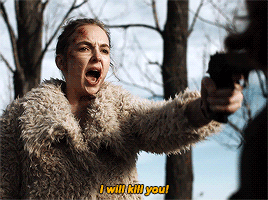
He goes on.
Originally, I was going to be on it for a shorter period of time. I had originally planned to be on it for about eight issues, I think. And then when I was getting the twice-monthly book in on time (which is tough; they really beat you up), they asked me to stay on.
There are better, more eloquent arguments against the fortnightly publishing schedule — which is incredibly punishing for creators and prioritises quantity ahead of quality — but none, perhaps, are more simple or succinct than James Robinson got to write twenty issues of Wonder Woman because he got his scripts in on time.
And that gave me more time to develop Jason and play with him more.
I was careful to make sure it wasn't only about Jason, however. I was already getting crap from social media about how this is Wonder Woman's book and she should be the center of attention at all time. You know how strident Wonder Woman fans can be.
Well, that’s an interesting and thoroughly disingenuous interpretation of the critique.
The criticism was not that Wondy must be “the centre of attention at all times”, and therefore Robinson was wrong to spend any time developing any character other than her.
It was that Robinson turned Diana into such a passive, reactive — and, frankly, incompetent — character that she became barely necessary to the story at all. You could remove her from most of the issues in the Darkseid arc without affecting the progression of the plot at all, because she never does anything.
Yes, I got irate when Diana would routinely show up in six or seven pages of an issue, if she appeared at all. Funny thing, when I pick up a book titled Wonder Woman, I expect to occasionally see some actual WONDER WOMAN.
But that was the symptom rather than the problem. Because even when Diana was on the page, she was absent from the story.
And part of this is also about the characters Robinson chose to focus on instead of Wondy: Jason, Grail and Darkseid. Three characters that a lot of fans weren’t interested in, didn’t like and frankly resented having shoehorned into Wondy’s story. True, Robinson may have been asked to include them in the story, but it was his choice to prioritise them over Diana, and it was his writing that shaped Jason into such an odious character (something he confirms in the interview: Johns came up with the idea, he says, but “Most of who the character is now is stuff that I've actually come up with.”)
Put it this way: I didn’t see anybody complaining in December 2016 when Greg Rucka devoted an entire issue to Barbara Minerva’s backstory, did you?
But oh, I’m sorry, was that too strident for you?
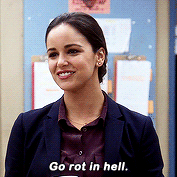
Nrama: During your run, you tied into several events that were going on elsewhere in the DC Universe. Even this current story arc ties into Dark Nights: Metal and involves the Justice League. Was that a goal, to make Jason part of the greater DCU?
Robinson: Yes. I always do that stuff, though. I always try to tie into bigger stories. Whether it was my stuff at DC or what I did at Marvel, like Fantastic Four and Invaders and what-not, I always enjoy that about comic book universes. I like when writers try to embrace the whole place.
Here’s the thing about this.
I like the sandbox nature of a shared universe. I’m not a fan of event tie-ins, which have a tendency to derail the stories of individual books in order to aggressively market some company-wide crossover that I couldn’t care less about, but I like that there’s this whole wider world of heroes and villains and settings and mythologies that writers can draw on and play with. And you can tell some really cool stories out of the collision of those different mythologies and characters — think Phil Jimenez’s ‘Gods of Gotham’, for instance, where the Wonderfam and the Batfam are forced to team up when some of Batman’s most powerful rogues are possessed by Ares’ children.
That’s not the way Robinson loops the wider DCU into his stories, or at least it wasn’t in Wonder Woman.
Robinson goes for insider references, often obscure ones, of the sort that will only make sense to people who’ve been reading the same comics as him over the past three decades.
In WW #33, he introduced and then immediately killed off a rebooted version of the Atomic Knights in a four-page sequence that added nothing to the plot.
In WW #42, he featured a flashback to Jason fighting the Deep Six, a group of Jack Kirby villains. Ostensibly this is framed as a set-up by Grail to orchestrate her first meeting with Jason, but Robinson milks it to crack jokes about Kirby’s 1970s dialogue — and if you’re not familiar with the characters (as I wasn’t), their inclusion makes little sense.
In the same issue, Robinson also works in the Wild Huntsman… apparently for no other reason than to amuse himself… and again, if you don’t know who he is, you’ll have no idea why Grail is trying so hard to kill him or why you should care.
And then there’s the Metal tie-in.
Like I said, I don’t like event tie-ins, but it is possible to make them work. G. Willow Wilson’s Ms Marvel has been looped into a number of crossover events over the course of its life, and while I’d prefer that clusterfucks like Civil War II stayed the hell away from Kamala and her pals, Wilson has done an effective job of using these events as a springboard for some really interesting personal conflicts and character work. There’s no extra required reading for these stories; she gives you everything you need to know, so those who aren’t following the event aren’t at a disadvantage.
Robinson gives you nothing.
This is how he links the Dark Gods’ story into Metal:
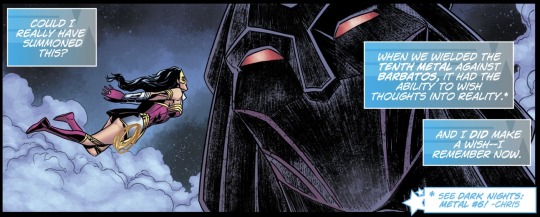
Diana [narration]: Could I really have summoned this? When we wielded the Tenth Metal against Barbatos, it had the ability to wish thoughts into reality.*
Ed. note: * See Dark Nights: Metal #6! — Chris
And a couple of pages later —

Karnell [narration]: ...our beautiful world — which you regard as the ‘Dark Multiverse’ — we see as a paradise… where we were more than even gods to our worshippers… we were everything!
I didn’t read Metal and I’m not planning to. That’s not a value judgement, it’s just not something that sparks my interest.
But it means I don’t know who the bloody hell Barbatos is, and I’ve never heard of the Tenth Metal. I don’t know what the Dark Multiverse is, or how it works, or how it differs from the regular multiverse. When Robinson says Diana made an inadvertent wish while she was wielding this Tenth Metal, I don’t know if he’s picking up on a story point in Metal that I need to read up on.
So right off the bat, Robinson has alienated anybody who isn’t familiar with the event comic he’s drawing from.
And what infuriates me is that at the same time as he was doing all this, Robinson was getting muddled by Wonder Woman’s continuity, conflating superseded New 52 canon with (contradictory) Rebirth canon, inadvertently retconning things and failing even to keep his own narrative consistent. I’d argue he needed to spend less time making references to other comics and more time making sure he understood the one he was writing.
Robinson: [...] what I've always loved about Wonder Woman is her strength. Even when she was in that phase in the white costume, where she didn't have her powers, she had great strength.
Oh, you mean this era?

The era where Diana lost not only her powers, but all of her training and skills? Where she became a weepy, insecure romantic heroine, reliant on men to guide and save her from her own inexperience and her uncontrollable female emotionality? The era where she was constantly crying over her latest rugged love interests? That awesome era?
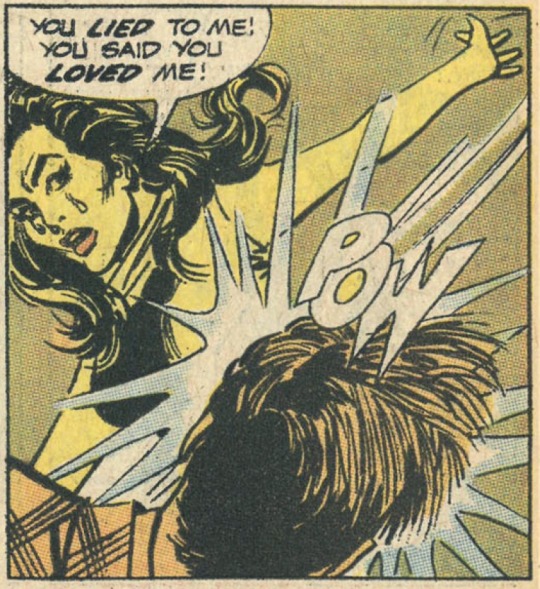
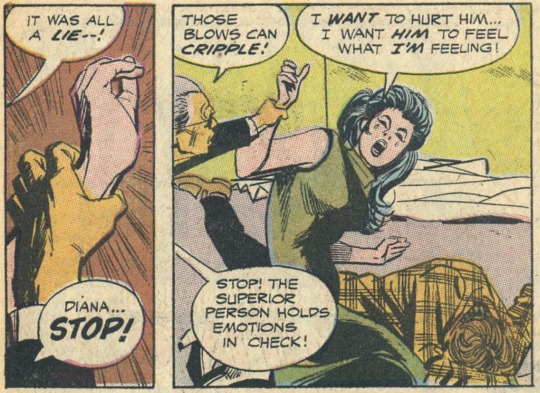
(Also misogynistic, racist and homophobic as fuuuuuck, but that’s another discussion.)
One of the reasons that era ended was because Gloria Steinham [sic] said, "Hey, she's Wonder Woman! She's a superhero and you've taken away her powers!"
But I actually thought her lacking powers was like saying, I don't need them to be a strong woman. And I think that was almost a more powerful message. I was surprised Ms. Steinem didn't get that, to be quite honest with you.
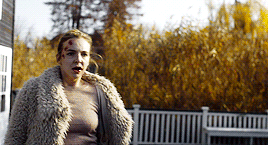
This is a characterisation of Steinem’s role in that period of Wondy’s history that I’ve seen before (always from men in the comics field), and it’s never sit well with me. It carries an unpleasant shade of gatekeeping.
The implication is that Steinem’s feelings about Wonder Woman (a character had loved since childhood) were less valid or even flat-out incorrect because she hadn’t read the right comics, that she was an ignorant outsider who ruined a good thing by coming in with a political agenda and trying to make Wonder Woman about feminism, that she didn’t have a right to complain about the comic because she wasn’t a ‘real’ fan.
And what Robinson doesn’t mention, as critics of Steinem and Ms. Magazine’s lobbying for a return to the classic Wondy rarely do, is that this campaign was set against a backdrop of unimpressive sales numbers and a struggle over the new direction that eventually gave rise to an ambitious and quite likely divisive ‘women’s lib’ arc written by African-American sci-fi writer Samuel R. Delany, which was intended to culminate in Diana triumphing over a group of male thugs attempting to shut down an abortion clinic run by women surgeons.
I have no doubt that Steinem played an important role in the way events panned out, but I’m also not surprised the ‘women’s lib’ arc never made it past its first issue.
(It was a truly dreadful first issue, btw, though the whole story behind it and what Delany was trying to do with it is fascinating.)
But that didn’t stop DC from kicking off Wondy’s superpowered return with the murder of a composite character representing Steinem and female DC editor Dorothy Woolfolk (whose name had previously been floated as editor for the book).
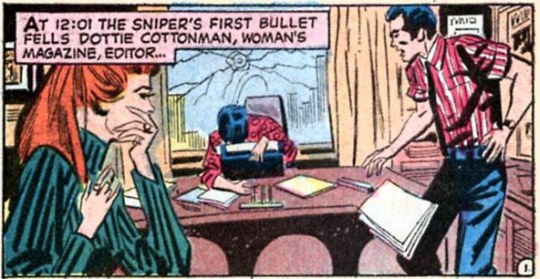
Then as now, Steinem got blamed by the gatekeepers for daring to interfere with Wonder Woman.
Nrama: Do you think Jason picked up some of her strength over the course of his story arc during your run?
Robinson: I think so, at least at the beginning as he was starting to develop. Now, technically, I suppose he's more powerful than her in that he has the power of their father Zeus and the power of storms and air control and things like that.
I like the fact that when he's given this armor, he realizes that his sister should have gotten it.
And he knows that the powers he has do not make him the better hero.
He knows his sister is the better hero.
So by the end of it, he just wants to be worthy of her, which I think was a nice character arc for him.
I can see how Robinson tried to achieve this character arc, but I wouldn’t call it anything close to a success.
Jason started as a deeply, deeply unlikeable character. He’s deeply selfish and emotionally immature. He doesn’t think about the consequences of his actions, mostly because he’s only ever concerned about how things affect him. When he learns about the mother he never met, when his adoptive father vanishes, every time Hercules leaves on one of his journeys, as he follows his twin sister’s heroics through the media — his thoughts are never about them and what they’re doing, or how they’re feeling, or if they’re okay. It’s always about how they’ve failed him, wronged him, abandoned him.
When we first meet him, he is helping goddamn Darkseid to systematically murder his own siblings. And it’s not because he’s being mind-controlled, or elaborately manipulated into believing that Darkseid is the good guy. It’s because he hates the guts out of Diana, the sister he’s never met, because he believes he’s entitled to the life that she has, and he wants to kill her for it.
If you want to get your readers past all that, you need one hell of a redemptive arc, and that’s one thing Jason never gets.
Because what happens next, after Jason gets an attack of conscience and switches sides, is that he freeloads off Diana, trashes her house, guilt trips her when she tries to set boundaries, and then when, heroism and glory don’t immediately come easily to him, runs away from home in the middle of the night.
The next time we see him is when he returns with the armour and a personality change. He’s still inexperienced, brash, impulsive and annoying, but that’s more or less the extent of it — he’s no longer the thoroughly objectionable character we saw in his first seven issues, and there’s no real explanation for the change.
Really, the vast majority of Jason’s character development takes place in the space between his disappearing at the end of WW #40 and reappearing at the end of WW #41.
Nrama: Wonder Woman #50 definitely feels like it's an ending to your time on Jason's character, and even his time in the book.
Robinson: It definitely has an element of finality to it, but Jason can be there for other writers, or indeed me, if I ever got to write him again.
Excuse me? If you ever got to what now?
Nrama: Is that a hint?

Robinson: I do enjoy writing him. I have this vague fantasy of one day doing a story and calling the comic Jason's Quest, which is an old DC title.

But no one's asked me so far and probably won't. So it's just something in my mind right now.
please, dear god in heaven, please let it stay there.
27 notes
·
View notes
Note
So I really want to get into the wonder fam.I read most of the WW comics but not so many about Donna and Cassie,except for Teen Titans.I would like to read something with all 3,can you recommend me anything?(sorry this ask is so long)
Hi anon, the ask is not very long but the answer might be… Donna Troy and Cassie mostly appear in teen titans and titans related comics so you’re good if you read these. I don’t know if you’ve read the original young justice comics but you should definitely check it out.
Now about all three of them, it’s a little surprising but there are not many comics with all three of them in the same page/panel.
Cassie Sandsmark was introduced during John Byrnes’ (#101-136) run in Wonder Woman v2 #105 and she interacted first with Diana and then with Donna separately. From his run you can read: #125-127,136. Generally speaking, i’m not a big fan but the Cassie/ Donna interactions are adorable!
Fast forward to Phil Jimenez’s run(#164-188) you can read the following: Wonder Woman v2 #166,167,174,186,187. I’d advise you to read his run, it’s very wonderfam heavy.
Rucka’s run (#195-226) as amazing as it was it had almost zero Donna because she was dead most of the time but it did had Cassie.
And finally: Wonder Woman v3 # 2-4 + Annual 1, 17, 27,28. The last 3 were from Gail Simone who’s run is worth checking out…
That’s pretty much it, i might have missed some but that’s all their interactions in Wonder Woman comics…
I hope i helped and please let me know if you need any help with anything else :)
25 notes
·
View notes